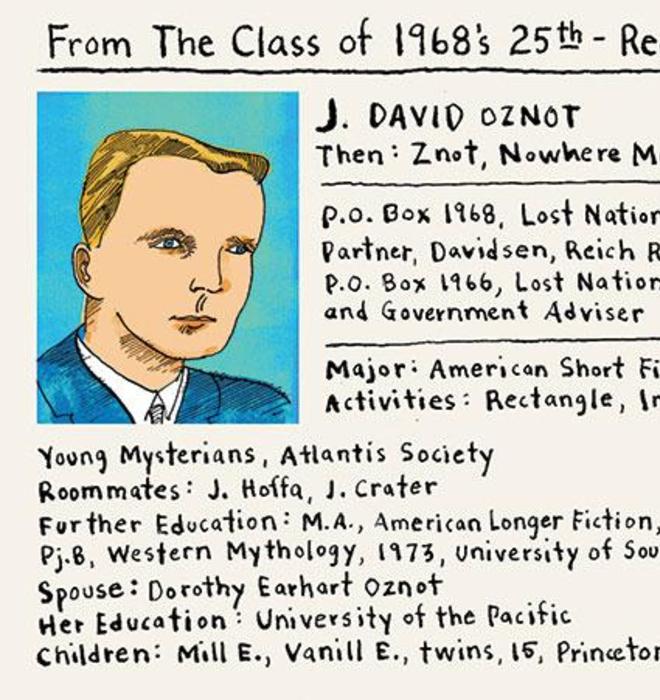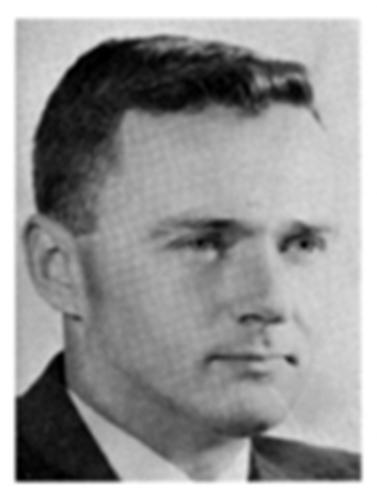
J.D. Oznot ’68, 25 Years Out
The Class of ’68’s 25th reunion book, published in 1993, highlighted the post-Princeton exploits of fictional classmate J. David Oznot.
J. DAVID OZNOT
Then: Znot, Nowhere Man
Now: Hoosie
P.O. Box 1968, Lost Nation, IA 52254
Partner, Davidsen Reich Reid & Talcott Detective Agency, P.O. Box 1966, Lost Nation, IA 52254; Itinerant Lecturer and Government Advisor
Major: American Short Fiction
Club: Princeton Inn
Activities: Rectangle, Intramural Shadow Boxing, Young Mysterians, Atlantis Society
Roommates: J. Hoffa, J. Crater
Further Education: M.A., American Longer Fiction, 1969, Michigan State University; Pj.B, Western Mythology, 1973, University of Southern North Dakota at Hoople
Spouse: Dorothy Earhart Oznot
Her Education: University of the Pacific
Children: Mill E., Vanill E, twins, 15, Princeton ’00
Twenty-five years. It’s gone so fast I can barely remember. It fact, it really does seem like lost time. But there are at least a few highlights that I do want to pass on to my classmates.
Most happily, I have ended up combining my three greatest loves: Private detection, wide-ranging authentication and service to my country.
READ MORE The Oznot Project: How a Bunch of College Sophomores Outsmarted Princeton
My love for the first comes, as it does with so many of us, from my father’s occupation. He was, you will recall, a private detective in East Lansing, Michigan, and I gloried in his epic tales of rooting out fraud and deception and finding persons both legitimately lost and illegitimately interested in not being found.
So it was that I pursued the graduate study I did. Some of you may find my choice of the University of Southern North Dakota at Hoople surprising, since it is far better known for its Musicology Department, chaired by the illustrious Professor Peter Schickele, discoverer of many lost works of the European composer P.D.Q. Bach. What is less known about the school is that it pays so poorly that Schickele has established an underground school for detectives to teach the techniques he has developed to unearth a string of P.D.Q. Bach compositions — works that all too often involved fraud, deceit and a staggering lack of originality.
Soon after receiving my Pj.B., I met my wife, Dorothy Earhart, when I was bitten by the entrepreneurial bug. Seeking to apply my academic rigor to the real world, I became involved for a brief time in establishing a business to fix personal responsibility in airlines losing luggage. I and my partners had thought to sell the service — endorsed by the great-niece of the greatest name in lost luggage — as part of travel-insurance packages. The thought was that finding a real live person on which to pin the blame might prompt airlines to settle with woebegone travelers more quickly. Unfortunately, the business plan and our start-up funds were packed in Dorothy’s checked valise, which lived up to her great aunt’s heritage by mistakenly ending up on a flight to Machu Picchu and was not recovered until several months later.
Emily, however, was seen again. We were mutually attracted by our fascination with things and people lost, became engaged and soon married. For our honeymoon, what better choice than a trip to Machu Picchu in search of lost luggage — which we did indeed find and triumphantly return with.
Now with a wife and thoughts of a family at some point in the future, I faced the challenge of gainful employment. As luck would have it, my investment partners in lost luggage insurance were impressed enough with my South American sleuthing to suggest we collectively form a detective agency — choosing our home in Iowa for its marquee value rather than any travel convenience. We are, however, very centrally located. In tune with my general shyness and aversion to any publicity, we kept my name out of the letterhead, though I am Managing Partner in all but name.
In the years since, we have been successful enough for me to indulge my desires to serve my country and pursue a wide range of commercial authentication work on the side. First, the former.
I have embraced the tradition of “Princeton in the Nation’s Service.” Though at first reluctant to even answer my letters, successive administrations in Washington soon saw the value of my authenticating skills. The Republicans in particular came to value my skills in keeping things hidden and undiscoverable.
Two of my more notable assignments have been authenticating the strategic strength estimates of the Iraqi Republican Guard; and establishing once and for all the underlying economic strength of the Central Planning System of the U.S.S.R.
A particularly challenging assignment has been my continuing retainer from Jamaica to find authentic training sites for its Bobsled Team. A near-insurmountable obstacle is that temperatures low enough to sustain snow and ice on the track are too low for steel drums to sustain the mellow harmonies the Jamaican team members find find vital to their training. Accordingly, gently ringing bonnggggggs become harsh, discordant BONKS — and the Jamaicans miss their start every time.
As a commercial authenticity consultant, I have advised several publishers and major media companies on their most important projects, including Newsweek and Der Stern on the Hitler Diaries; McGraw Hill on the Clifford Irving biography of Howard Hughes, The Washington Post on “Jimmy’s World,” its Pulitzer Prize-winning series on the inner-city life of a young child involved with drugs; and the English publishers of the soon-to-appear Diaries of Jack the Ripper.
In the broader corporate sector, I worked with Volvo on creating several of the more memorable advertising campaigns. And I was particularly busy in the early and mid ’80s in the software business. Though Stewart Alsop Jr. has claimed origin of the phrase “vapor-ware,” it was mine, as were the estimates of “months in vapor.” It was heady times, I must tell you. We’ll not see the like of it again at least until the Republican presidential primaries in 1996.
To relax in the few spare moments that come my way, I have quite unexplainably developed a fondness for test-driving heavy military vehicles. I really don’t know why, but I think my childhood shyness and long-standing preference for the background in business deals is a clue. I just find it wonderfully relaxing to be totally invisible inside a great large vehicle. One of the few times I have been able to combine my avocation and secondary vocation occurred in in 1988, when I was summoned by senior Democrats to measure the authenticity of the Dukakis campaign — and convinced him to take a tank ride with me. Of course, no one knew it was I at the tiller down below.
But nothing is more important than my wonderful family. Since their arrival in 1978, the twins, Mill Earhart Oznot and Vanill Earhart Oznot, have been the focus of the life Dorothy and I have together. They are both down for Princeton, of course, and have been showing a great fondness for show business — quite the opposite of their parents. Both are stellar on air guitar and have been in and out of several groups.
Will we make it to the 25th? It’s hard to say. It’s a long poke from Lost Nation to Old Nassau, and quite frankly, we’ve seen better times. Once the ’92 campaign was over, my authentication work fell right off the chart. And the agency is just barely surviving. The media explosion and advent of 500-channel cable systems has hurt our businesses of finding things and people that don’t want to be found. It seems programming chiefs are looking everywhere to find material.
But I’ve already started looking for my end of the Orange Brick Road.







No responses yet